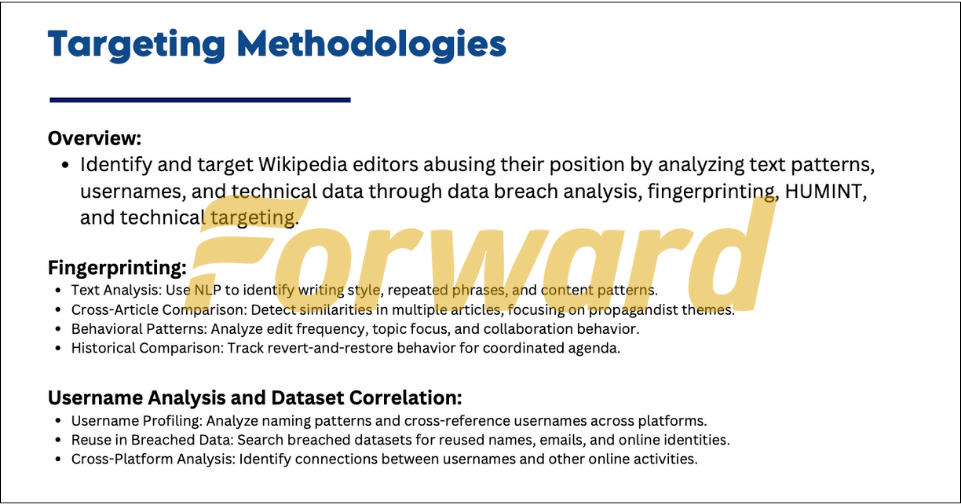The Heritage Foundation, a prominent conservative think tank, plans to “identify and target” Wikipedia editors who it believes are engaged in antisemitism, according to documents obtained by the Forward. Photo by Getty Images
The Heritage Foundation plans to “identify and target” volunteer editors on Wikipedia who it says are “abusing their position” by publishing content the group believes to be antisemitic, according to documents obtained by the Forward.
Employees of Heritage, the conservative think tank that produced the Project 2025 policy blueprint for the second Trump administration, said they plan to use facial recognition software and a database of hacked usernames and passwords in order to identify contributors to the online encyclopedia, who mostly work under pseudonyms. It’s not clear exactly what kind of antisemitism the Wikipedia effort, which has not been previously reported, is intended to address. But in recent months some Jewish groups have complained about a series of changes on the website relating to Israel, the war in Gaza and its repercussions.
In June, a panel of Wikipedia editors declared the Anti-Defamation League a “generally unreliable” source of information about the Israeli-Palestinian conflict, limiting when the organization can be cited in Wikipedia articles. And there was an outcry this fall among some Jewish scholars and pro-Israel activists over edits to Wikipedia’s entry for Zionism to add references to “colonization.”
Wikipedia has also recently drawn ire from right-wing figures including Elon Musk, the billionaire who has been by President-elect Trump’s side during much of the transition. Musk posted on X (formerly Twitter) in December: “Stop donating to Wokepedia.”

A Heritage Foundation spokesperson said she was not able to answer questions about the organization’s work related to Wikipedia, which editors it was seeking to identify or how it sought to “target” them. The Wikimedia Foundation, which provides the infrastructure for Wikipedia, declined to comment.
The Heritage Foundation sent the pitch deck outlining the Wikipedia initiative to Jewish foundations and other prospective supporters of Project Esther, its roadmap for fighting antisemitism and anti-Zionism. The slideshow says the group’s “targeting methodologies” would include creating fake Wikipedia user accounts to try to trick editors into identifying themselves by sharing personal information or clicking on malicious tracking links that can identify people who click on them. It is unclear whether this has begun.
Tamzin Hadasa Kelly, a prolific Wikipedia editor, said that the methods mentioned in the Heritage document were familiar, and that Wikipedia editors know that it can be difficult to maintain their anonymity.
“It’s scary they want to do this, but it’s not a ‘zero day,’” Kelly said in an interview, referring to the most dangerous type of hacking.
Allegations of bias
Wikipedia has long faced claims from conservatives that it has a liberal bias. Chaya Raichik, the Orthodox former real estate broker behind “Libs of TikTok,” has assailed Wikimedia’s spending on diversity programming, for example. And a June study from the right-leaning Manhattan Institute found a “mild to moderate tendency” for Wikipedia to more negatively describe some conservative public figures.
Several prominent Jewish groups have also expressed concern that Wikipedia is tilted against Israel. A World Jewish Congress has released a report in March said the site’s articles about the Israel-Hamas war were biased in “terminology, framing and lack of context, one-sided sources and critical omissions,” while Aish.com, an Orthodox news website, said in November that it had been “hijacked by digital jihadists.”
In May, the Los Angeles Jewish Journal ran a cover story titled “Wokepedia?” that described “seven tactics Wikipedia editors used to spread anti-Israel bias.” The article said that the term “anti-imperialism” had been added to the Hamas page as one of the Palestinian terror group’s ideologies, and the term “antisemitism” removed. Neither term is currently on the Hamas page; editors frequently discuss and change the content of controversial articles.
(Wikipedia has an entire entry on the back-and-forth between pro-Israel and pro-Palestinian editors of the encyclopedia that it says began in earnest around 2006.)
Campaign would be unusual
The Heritage Foundation told prospective donors the project would be led in part by Tom Olohon, a former FBI agent, and noted that he had won a SHIELD award from the ADL in 2015.
The ADL did not respond to a request for comment about Wikipedia, the Heritage Foundation project, or the group’s mention of its award in fundraising efforts. After Wikipedia declared it an unreliable source on Israel and Zionism in June, ADL rallied more than 40 Jewish groups to oppose the site’s decision and stated that “Wikipedia is stripping the Jewish community of the right to defend itself.”
The appeal was directed to the Wikimedia Foundation, which said that it does not interfere in decisions made by Wikipedia’s volunteer editors.

The ADL had faced backlash in 2021 after several of its staff members were found to be editing Wikipedia entries on domestic extremism to add information about the organization’s research. The site’s rules generally discourage editing aimed at promoting an organization the editor works for, but an ADL spokesperson said at the time that its employees had followed the rules by disclosing that they worked for the group.
“Doxxing,” or unmasking the identity of anonymous editors in Wikipedia, violates the site’s rules and can result in users being banned, according to the site’s guidelines. Kelly, who has been a volunteer editor on the site since 2012 with a focus that includes sexuality and religion, and previously served as an administrator, said that in the past, such problems have usually been rooted in interpersonal conflicts or ad hoc online campaigns
A well-funded campaign against individual Wikipedia editors by an organization like the Heritage Foundation, which is one of the most prominent conservative think tanks in the country, it seems, would be a first.
Molly White, an independent journalist and Wikipedia contributor who wrote an article last week describing “the right’s war on Wikipedia,” said Heritage’s plan to target editors was concerning: “The document is sort of vague about what they would do once they ID a person,” she noted, “but the things that come to mind are not great.”

I hope you appreciated this article. Before you go, I’d like to ask you to please support the Forward’s award-winning, nonprofit journalism so that we can be prepared for whatever news 2025 brings.
At a time when other newsrooms are closing or cutting back, the Forward has removed its paywall and invested additional resources to report on the ground from Israel and around the U.S. on the impact of the war, rising antisemitism and polarized discourse.
Readers like you make it all possible. Support our work by becoming a Forward Member and connect with our journalism and your community.
— Rachel Fishman Feddersen, Publisher and CEO
